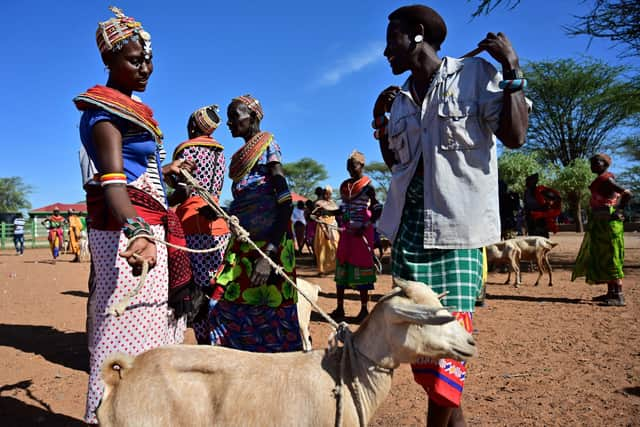Humans work best when dealing with life on a people-sized scale – Kate Copstick
One of the many things I love about Kenya is the ever-delighting disconnect between what the 'rules' supposedly are and what actually is, “on the ground” – a phrase I first heard here, and one of the most important in the world, and for the world. It might even save the world.
One of the ways 'civilisation' changes the world is by centralising government. The word itself, fundamentally, means 'turning into cities'. That has gone well. But I am getting ahead of myself.
Advertisement
Hide AdAdvertisement
Hide AdI am currently in Kenya, living my other life “on the ground”. Getting here, if you follow the rules as found on any number of travel sites, requires a visa, a PCR Covid test and a QR code for more paperwork. Imagine my horror to find, earlier this year that I had thrown £89 down the drain as the burly chap at immigration declares most of it was no longer necessary but the QR code (which I had no knowledge of) was. Luckily you could still get one 'on the ground'. Kenya is so good at 'on the ground'. This trip an equally burly chapess squinted at my QR code and announced “not necessary”.


Driving back to Casa Copi, we come to a massive junction where the lights are red. Two cars sit waiting for them to change. All other traffic is hooting angrily at them and simply driving around them to continue up their chosen road.
“Why are they stopping?” says my friend David, also hooting angrily. “The lights are red. This means stop,” I suggest. David accelerates across the junction. “But there is no traffic! Why just sit?”
“It is the law?” I know I will not prevail in this discussion. “It is Sunday!” he states. That concludes the case for the defence. And I get home in record time.
My first night in my little room is spent cleaning – the dust here in my tiny corner of Nairobi seems to be oil-based, thick, black and leaves a dark smear when removed. So I get to spend a fun 15 minutes shaking anything textile-based over the railings and watching dozens and dozens of marvellously healthy-looking rats and their families scurry away from the unexpected noise. I like rats. And I feel sorry that they have to live in our filth. Sooo much filth. But that is 'civilisation' for you.
I have a packed schedule. My man in the west has three more tiny communities who need a Mama B Raincatcher, which, on the ground, costs about £70, provides a community of four or five families with clean drinking water as long as even a little rain is falling, and wipes out diarrhoea and water-borne diseases.
Then there are a couple of hundred women and children desperate to escape from a ghastly pic 'n' mix of abuses, including, but not confined to, FGM, early marriage, rape, forced prostitution, domestic violence, tribal violence, and murder. Please do not panic, they will all be well.
In a different place, where the girls go to school as well as the boys, there is no abuse, the women are in charge of their own, independent lives and the new businesses they run will fund it all. The boys will grow up to respect women, and no girl will be cut or sold. And these groups expand and, themselves, fund more groups.
Advertisement
Hide AdAdvertisement
Hide AdThis is how things change fundamentally. At the fundament. On the ground. I know it sounds simplistic. But it has been working since 2012. A couple of hundred people at a time.
Over a beer (maybe two) I enjoy one of my favourite things. There are some ladies who never fail to ask me “what are the pink pen ladies saying now?” Bridget Christie has a healthy following here, since I told this group about her Comedy Award-winning show 'A Pen for Her' (Bic had brought out a pink pen marketed at the female market and Mz Christie wasn't best pleased).
I usually give them a decent 20 minutes from the front line in the latest in the woke/PC wars. Trans women in sport, personal pronouns, gender identity, the woman who identified as a cat, and linguistic censorship get me the kind of reception that Frankie Boyle can only dream of. “But I am fat,” says Wanjiru (who, to be fair, is). “You are very fat,” says Jacintah. And they convulse with laughter.
To be totally honest, Kenya is appallingly homophobic. But that is the fault of the white missionaries who turned a lovely polytheistic land into a load of judgmental, hypocritical homophobes. And the effect of Islam (all about inclusivity, me, especially when handing out the blame), which has been just as anti-gay. Must be a Jesus thing. But I digress.
And now I am changing the subject again. People work best when they have a people-sized world. 'Charity' (I hate that word) works best when it is on the ground, where not every campaign is decided in 'overview' or by extrapolation. People deserve better than to be reduced to part of an 'overview'. I absolutely implore you to read EF Schumacher's writings on aid-giving.
Now I am off to buy a load of soap-making chemicals for one of our groups (no, neither organic nor vegan but needs must when the devil drives and the devil is driving) and some animal food which, when mixed with chicken poo, will maximise the milk yield from your cow. Every day, a school day, here on the ground.
Kate Copstick is founder of women's charity Mama Biashara and a writer
Comments
Want to join the conversation? Please or to comment on this article.
